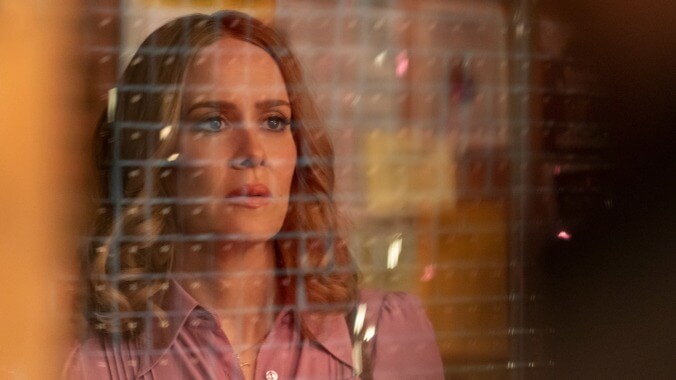This episode is called “Houston,” but it might as well be called “Alice,” or rather “That Time Alice Got High at the Women’s Convention.” I’ve often wondered how Alice’s friendship with Phyllis would develop and change over the series. I have to say, Alice having a nightmare of Phyllis pushing her down into the bed while yelling at her that she was rejecting her was not on my bingo card. But maybe it was on Sarah Paulson’s?
This episode is a neat hat trick by writer Dahvi Waller and director Janicza Bravo. (Makes sense, considering Waller is the creator.) By focusing on Alice, the episode of the convention is streamlined: all female protagonists show up, but as representations of their past episodes rather than bloating this one. By focusing on a fictional character for once, we get to enjoy some suspense as to how the character will grow. By focusing on her experience of the convention, we get to experience it ourselves.
And what an experience it was! The convention looks really fun! I have to say, this was a pretty hard episode to watch during this pandemic. Of course the creators had no idea we’d all be watching it in a year when SXSW and SDCC would be cancelled, with very little idea of whether either the RNC or DNC would go on as scheduled. Not to mention just getting together with your friends, or making a friend at the bar…anyway. It was also just hard to watch a convention full of women just learning and being and talking and singing. Why can’t we have conventions like this every year?!
I expected a fight this episode, but instead we just get to watch every liberal amendment pass every vote on the convention floor. The focus on Alice’s experience make the episode feel communal to the viewer, especially with all the female characters we’ve seen over the course of the show—not just Bella and Gloria and Betty, but Jill and Brenda and Margaret and Flo and Audrey (the last three women of which should’ve gotten their own episodes, but you know…). And the fact that Alice gets high makes the events and sections of the convention blend together in a surreal kind of harmony.
Any guesses on what gets Alice so high? At the bar Alice makes a friend (Julie White). who gives her a “Christian pill” before grabbing a few rounds of drinks with her. I figured she might be just drunk when she starts sniffing Gloria lookalikes and asking for literal directions at the concierge, but when the soundtrack started blaring train whistles, I wasn’t so sure. It doesn’t help that later on she picks up a brownie at one random event.
It’s fun to watch Alice’s shenanigans, especially her eating Indian food and singing “This Land Is Your Land,” by Woody Guthrie, call out Brenda while she gives a talk about being fired from the ACLU when pregnant (damn), and takes the Eucharist that’s been consecrated by a nun instead of a priest. But sometimes the episode defies my belief of how far Alice would be influenced by the convention, like how she immediately whispers “I’m sorry,” about Rosemary’s posters that say “Mother, when I grow up, can I be a lesbian?” Or when she rapturously watches Gloria, Audrey, and other women work on the amendment for women of color. It’s even harder to care, ultimately, about her reaction when she’s a fictional character. I found myself wondering if her character would really act like that, if she’d actually feel guilt or frustration or discomfort with their platform.
A few things complicate this matter: the woman she meets at the bar, who seems to be exactly like her—but volunteers with NOW. I had no problem believing a character would exist, and would be so similar to Alice.
Second, there’s Alice’s admixture of fear and admiration for Phyllis. The terrifying nightmare is one thing, but Alice tells her new friend how much she admires how Phyllis has her own opinions and ideas about politics. She then goes on to wax poetic about their friendship, including how Phyllis checks her correspondence. Her new friend frowns in confusion, and Alice stumbles to explain why the way only a woman who has a very codependent friendship can. Throughout the series, Alice has gone back and forth between being Phyllis’ conscience and her “ringer,” as Phyllis’ daughter once called her. But without Phyllis, in an environment that was usually Phyllis’ domain, Alice doesn’t understand exactly why she’s repeating Phyllis’ words. She stumbles when she’s repeating them on camera, and she struggles to comprehend them when she actually meets a lot of the women they’d affect.
Alice has always seemed sheltered, but never more than this episode. Unlike when Phyllis would visit Washington, D.C., Alice gets to get out of her shell surrounded by inspired women rather than overbearing men. The way she stumbles when she can’t have her husband solve the problem of an overbooked hotel is another example.
On that note, I found it interesting we don’t see or hear from her husband this episode, for a show that loves its marriage dynamics. But then, I don’t think a single man or his voice even shows up in this episode. This show is very good at keeping women talking nonstop throughout the show, with a few lines here and there for men, but is this the only episode with no men in it at all?
We do get to hear about one marriage—poor Pamela’s. She’s debating even staying in Houston (DO IT, PAMELA!) to get away from her controlling husband and her near-constant state of pregnancy. At first, Alice is shocked that Pamela lied to her husband to come to Houston. “I drove you across state lines!” she snaps at Pamela, like she’s a wayward minor. But eventually, after being constantly irritated by Pamela, she finally agrees to help her.
Finally, this episode really highlights how little Phyllis taught her Eagle Foundation to think critically and how much she turned them into followers. I’ve often wondered how much Phyllis as a historical figure helped bring about the dismissal of truth or fact-checking, especially when Rosemary dismisses polling against the Eagle Foundation’s stance on the ERA.
Alice is left looking at Phyllis warily at the end of the episode, but Phyllis doesn’t really need her. While the show faked us out by accumulating buses slowly, Phyllis was reportedly able to bring 20,000 protestors to the convention, equal or quite possibly more than the convention attendants. Alice might see Phyllis more closely for who she is, but it looks like it’s too late to make a difference.
I have to say, I’m glad the episode ended at this moment. The women’s conference feels like a beautiful highlight, a wonderful shining moment in this fight. But as the end—and the next episode’s title—portends, this is just the calm before the storm.
Stray Observations:
- This is a great essay on what it was like to be at the conference.
- What was your favorite part of Alice’s trippy experience? Mine is when she said, at the same time as the nun, “Christ is dead.” Seriously, what are those “Christian pills”? Quaaludes?!
- Rosemary Thomson did indeed write that book “The Price of LIBerty,” a pun which does not work when spoken aloud.
- Were you tricked by any of the Gloria and Phyllis lookalikes? I jumped at every one.
- The way Alice and Pamela see Gloria walk towards them to the sound of “I Feel Love,” by Donna Summer! What a glorious entrance. Anyone who enters with that song at their heels has to smell good.
- I laughed out loud so much during this episode. One of my favorite parts was when Alice and Pamela just follow the torch runners to the conference.



 Keep scrolling for more great stories from The A.V. Club.
Keep scrolling for more great stories from The A.V. Club.